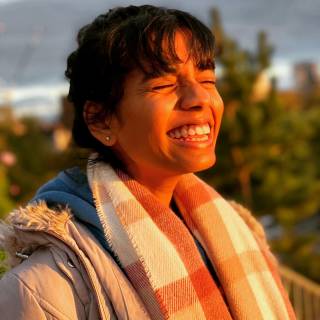Nivothiga Balendran, Advanced Neuroimaging MSc

1. What is your educational background?
I was born here, but my parents are from Sri Lanka. My parents had given up a lot for my brother and me and believed that education was crucial to give me the advantage to live a secure life with financial stability, unlike the challenges they were confronted with. Despite several obstacles, I managed to complete a Neuroscience BSc with a first and am a current student studying Advanced Neuroimaging MSc at UCL.
2. Why did you choose to apply to this programme?
Looking back on my Neuroscience degree, it was clear that I was drawn to neurophysiology, where I could conduct and record electroencephalographs and visual evoked potentials. I appreciated the underlying mechanisms that show where these signals come from and how they are displayed for clinicians to interpret. Nevertheless, these old techniques have limited use today. MRI, CT, diffuse tensor imaging, and a range of other modalities have widened research and clinical applications, which intrigued me to take on Advanced Neuroimaging.
3. What have you enjoyed most about the programme so far?
Even though I hadn't touched on any physics or IT in years, today I believe these are the lectures I look most forward to! I struggled at first; a lot of physics jargon terrified me and made me wonder if I had chosen the right master's program. However, I am proud that I used this opportunity to leave my comfort zone and ask for help. I was able to learn a lot more in an interactive way with the right supportive material provided, reaching out to lecturers when I was completely clueless, and taking the initiative to reach out to my peers when they came from a physics background.
I also like how we are located near the National Hospital so that we can see what we learned in the lecture hall in real time and meet and ask questions to those who use the machines on a daily basis in workshops hosted by the hospital.
4. What are your future career goals?
It is quite difficult to tell now, but I am thinking of becoming a science teacher. I enjoy sharing what I've learned with others and creating material to break down difficult concepts for an audience that may have no expertise in the field. Through my ways of learning material and my passion learn more, I plan to take steps in teaching as well as assist in research too.
5. What would be your top tip for incoming students?
It is okay to not know anything; it is about being resourceful! Also, rejection is not bad. As part of the course, you are to reach out to PIs who are conducting research. If you are rejected, it is more about what you are looking for that does not fit their research. You might not even find a research project you want to do; in that case, it is better to find a research project where you can acquire skills that would be useful when applying for PhDs or research assistant positions.
 Close
Close

